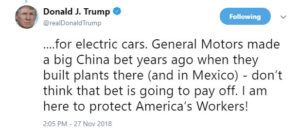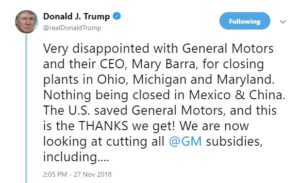He Threatens the Automaker after It Announces Midwest Plant Closings and Layoffs
Stung by the announcements by General Motors that it would be shutting five plants in the Midwest and Canada for smaller cars, Trump yesterday threatened to end General Motor’s federal tax credit for electric vehicles.
Trump tweeted that he is “very disappointed” with the company’s plans to lay off 15 percent of its workers, nearly 15,000, with a direct effect on small cities in Ohio and Michigan where the president campaigned with promises to expand manufacturing jobs.
“We are now looking at cutting all @GM subsidies, including … for electric cars,” he wrote.
Let’s be clear. Trump’s anger is politically based. This layoffs announcement came as a personal slap to him because he has backed manufacturers so often and loudly and given the company and its competitors tax cuts which have gone to stock buybacks rather than job growth. As one columnist noted, “General Motors just fired an arrow into the heart of President Trump’s #MAGA promise.” GM underlined the hard truth that economists not named Trump have long acknowledged – that the factory jobs that Trump carried the Rust Belt vowing to restore aren’t magically coming back, the column concluded.
Meanwhile, the stock market punished General Motors with a selloff of its stock reaching prices 3.8% below prices on Monday.

Trump has blasted GM and its CEO, Mary Barra, since the Monday morning layoff announcements and has pledged to take action to prevent the job losses. It remains unclear what other subsidies might be targeted by Trump, whether he would focus only on GM or end the tax credit altogether. Ending the subsidy would require Congress to pass a new law.
Larry Kudlow, White House Council on Economics director, confirmed that the White House is considering its options, including withdrawing the tax credit for electric cars.
For its part, General Motors said it appreciates “the actions this administration has taken on behalf of the industry to improve the overall competitiveness of U.S. manufacturing” and that “many of the U.S. workers impacted” by Monday’s layoff announcement “will have the opportunity to shift to other GM plants.”
The federal government provides up to a $7,500 tax break to U.S. consumers who buy electric vehicles. Two GM vehicles qualify for the incentive: the all-electric Chevrolet Bolt and the plug-in hybrid Chevrolet Volt (which will be phased out).
White House press secretary Sarah Huckabee Sanders was noncommittal on when Trump might make good on his threat. “I don’t know that there’s a specific timeline,” she said. “As he said, he’s looking into what those options might look like. The president wants to see American companies build cars here in America, not build them overseas, and he is hopeful that GM will continue to do that here.”
Now stop me if I don’t understand business well enough, but this is a president and an administration that believes first and foremost in corporate America to make good decisions for the rest of us. General Motors said it was stopping lines of cars that are not selling as briskly as trucks and SUVs. Isn’t this the natural corporate policy, even if it means widespread layoffs of workers just before Christmas? Hasn’t this become an annual rite for corporations?
More to the point, however, is that GM remains interested and hopeful in the building of electric vehicles. Today, electric cars, trucks and buses represent a tiny portion of American-built vehicles. But the trend is clear, in the United States and internationally. Doesn’t businessman Trump see the opportunity here for General Motors and other manufacturers to take the world leadership in electric car manufacturing? Wouldn’t this at once give the president something positive to say in response to continuing concerns about climate change as well as providing a path for the creation of new jobs in car and truck manufacturing?
As of the third quarter of 2018, GM was less than 4,000 vehicles away from hitting the point at which federal tax credits start to phase out. The phase-out starts when a manufacturer sells 200,000 electric cars. GM and other automakers are lobbying Congress to lift the 200,000-vehicle limit. Bills in both the House and Senate have been introduced but neither chamber has passed one of the measures.
Support for the tax credit generally falls along party lines, with Democrats in strong support and Republicans opposed. Nonetheless, Sen. Dean Heller (R-Nev.), who lost his re-election fight earlier this month, is the lead sponsor on one bill to lift the cap on the credit.
Any number of economists quoted by The Washington Post noted that the GM issue shows a growing rift between corporate concerns and labor. Several commented on a growing chasm between decisions for corporate good alone and those that show an understanding of community and people.
Frankly, it would be weird to think that Trump finds himself siding with the latter thought.





